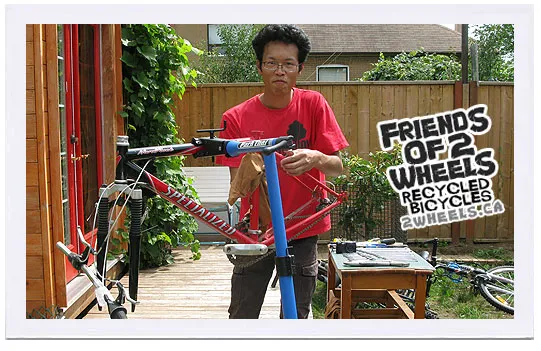Not too far from the former C.C.M. Weston Factory– where Canada Cycle & Motor Company from 1917 to 1983 manufactured the majority of bicycles made in Canada – in the Village of Weston outside of Toronto is the more modest home of Friends of 2 Wheels. Founded just last May this volunteer-run, not-for-profit, group looks to recycle used bikes, repair used bikes and in many cases give the bikes to those who could use the bikes as a viable means of transportation.
Mihály Felbert came up the idea after noticing a rusty bike by the side of road. It inspired a “can we do something with that bike?” moment, and from there a vision was born.
“That’s when it hit me, being green-minded and grassroots-motivated to help people in need,” Felbert told BikeRadar. “The charitable core in me spring into gear. I decided to look into who, and what was out there. Most charities were sending bikes to Africa, Latin America but there was a catch.”
Felbert discovered that many existing charities wanted cash donations along with donated bikes.
“Bike shops would spring up in those counties hiring bike mechanics and charging more money for the donated bikes,” he added. “This is not what I wanted to do and be involved with.”
He also noted that while the developing world certainly has a need for bicycles, where two wheels remain a truly viable means of transportation, in his own home town bicycles could also go a long way towards helping people get on the path to a better life.
“In Toronto there are 13 sectors of the city that are poverty stricken, many are emigrants, new to Canada,” Felbert said. “We should help those at our front door before extending limited resources abroad, unless it’s a national state.”

An example of an 'upcycled' bike processed through Friends of 2 Wheels
With his newly formed entity, Friends of 2Wheels looks to be both environmentally driven and a humanitarian movement.
“The only political part is that I’m trying to motivate the government to be interested in what I do, how I do it and for them to do their part; responsibility to help those in need, be environmentally conscious and start making Toronto a world-class city like Amsterdam where bikes are equal of not more important than motor-driven vehicles,” Felbert emphasized. “There are a few bicycle recycling organizations around me, and that’s great, but most don’t have the same core values as me. I’m not in it for the money. I’m in it for the love of worlds of bicycles and the people who made the bike a part of their lives.”
Felbert is also one who sees treasure where many others may see trash. How many people may have ridden past that rusty bike is unknown, but Felbert saw its potential. The downside in trying to dumpster dive and look for bikes tossed to the curb with the trash are that many junk dealers and scrap metal collectors are also going after the same would-be rusty treasure.
Reality TV with its numerous shows about finding such treasure have only made matters worse, but Felbert added that good old bartering solves the problem. Networking with locals also ensures that Friends of 2 Wheels has a steady rolling supply of bikes to work with as well.
“The metal collectors where I live would trade bikes they find in exchange for metal from the renovation work I’m doing in my house,” he noted. “I have diverted many bikes from condo property managers who chose to pass then onto me instead of landfills.”

A student works to earn a bike
As with other bicycle programs for the needy, Felbert admits that it is hard to determine who really needs a bike and how to accommodate all the requests. The supply never seems to meet the demand.
“Usually I’m approached about my Earn-a-Bike program and the stories are interesting, moving and sometimes sad,” he admitted.
At this point he is still developing the values and mission of the Earn-a-Bike program, which he hopes to refine this year. It involves those in need volunteering time gathering bikes or even learning how to build and repair bicycles. For their effort those who take part get to ride away on their own bicycle.
To finance all this Friends of 2 Wheels also does sell – as a not-for-profit – many restored vintage bikes to cover the cost of new bike parts, equipment and even tools to fix more bicycles. It is a program that is thus self-sustaining. It also allows Felbert and his colleagues to create, restore and refurbish some classic bikes.
“I’m totally focused of vintage cycles,” said Felbert. “My motto ‘things of yesteryear made new again.’”
As he grew up near the C.C.M. Weston Factory he spent time bin diving, and had made bikes with friends at the time. In many ways his life has come full swing.
“I love the wheelie, muscle bikes from the late ’60s and early ’70s,” Felbert said. “I’m also passionate about bikes from the turn of the century, war bikes and cargo bikes. There is more to a vintage bike than there is in a modern bike; unless a modern bike is made with visual and functional charismatic thought and design, it’s just going to live as long as the technology does. Eventually all new things become vintage, and that’s where I come in.”
